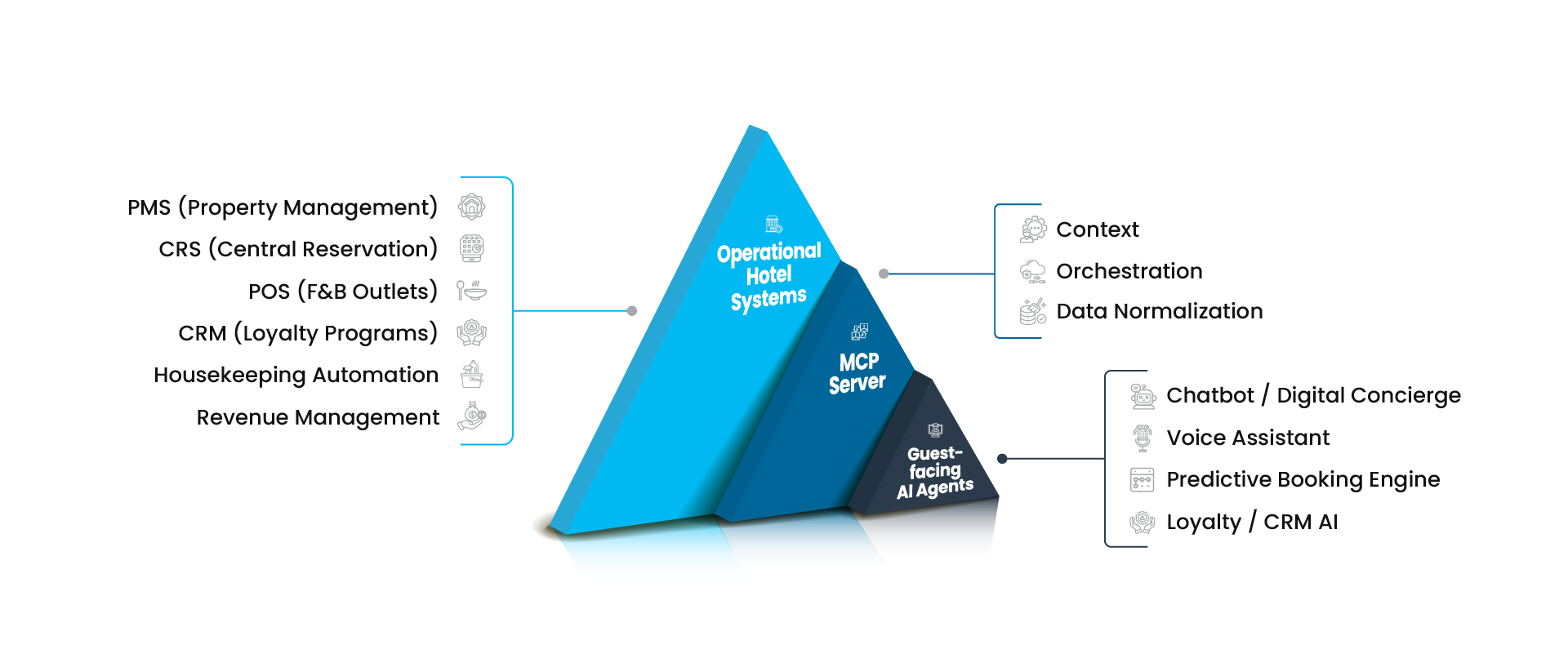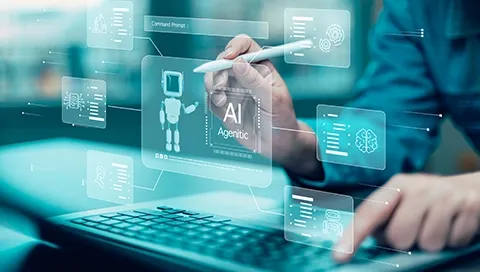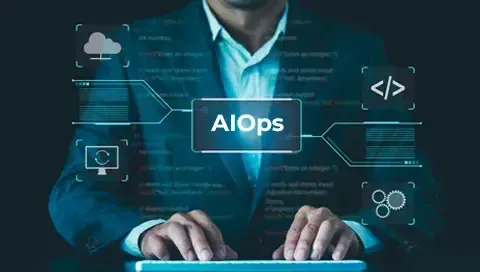In modern hospitality, guests move seamlessly between online booking sites, corporate channels, and travel agents. They expect every interaction with a hotel to feel smooth and intuitive. Behind the scenes, hotels rely on complex systems such as property management systems (PMS), booking engines, loyalty platforms, and point-of-sale tools. AI assistants are increasingly used to help guests explore offers, answer questions, and complete bookings.
Connecting AI assistants to these diverse systems can be challenging. Many hotels have multiple APIs, legacy systems, and inconsistent data formats. Without a standard framework, each AI agent would require custom integration, increasing development effort and cost.
Using the Model Context Protocol in Hospitality
The Model Context Protocol (MCP) provides a standardized framework for AI-agent interactions in hospitality. It establishes a set of rules for how AI assistants can safely and predictably communicate with the various hotel systems. Once a workflow is built for one system, it can be reused across multiple assistants or platforms, saving time and reducing repetitive integration work.
Essentially, MCP acts as a rulebook for AI interactions in hotel operations. It defines how to interact with APIs, what data to send and receive, and how AI assistants should call different services consistently. This subsequently ensures guests receive accurate, seamless information across channels.
The illustration below shows how the MCP server architecture connects hotel systems with guest-facing AI agents, acting as the intelligent layer that enables real-time, context-aware interactions.

The Architecture of MCP Servers in Hospitality Operations.
This architecture enables seamless integration between hotel operational systems and AI-driven guest experiences.
How Cybage Implements MCP Tools
Cybage implements MCP-compliant tools designed to cover the full booking and post-booking lifecycle. These tools are built to handle workflows such as searching rooms, retrieving rates, and generating booking links, including interactions that involve authentication and payment mechanisms. By following MCP standards, these tools enable AI assistants to interact with multiple systems predictably and consistently across different channels, whether web, mobile, or voice.
Our Approach to Tool Development
We build MCP tools after assessment and preparation of hotel systems, ensuring smooth integration without disrupting existing operations.
- Modular AI-Ready Tools: Each tool handles a single step—searching rooms, retrieving rates, generating booking links. Tools are stateless and reusable across web, mobile, and voice assistants.
- Secure API Integration: Tools connect to existing APIs in real time, providing accurate information without handling sensitive credentials or payments.
- Cloud-Native Deployment: Tools are containerized (AWS Fargate), managed via Terraform and CI/CD pipelines for reliable, repeatable, and scalable operations.
- Operational Monitoring: Logging, monitoring, and observability frameworks (Splunk, CloudWatch) track usage, detect anomalies, and support continuous improvement.
The development process is incremental and iterative, coordinated with hotel IT teams, and validated using simulations and sample data to ensure consistent AI responses across channels.
Architectural and Design Considerations
AI assistants perform best when underlying tools are simple, reliable, and secure:
- Modular and Stateless: Each tool performs a single function, enabling reuse and straightforward integration.
- Secure Connections: Integrates with PMS, booking engines, loyalty programs, and POS without storing guest payment or personal information.
- Cloud Deployment: Tools scale automatically to handle peak booking periods.
- Monitoring: Logs and tracks performance to quickly identify and resolve issues.
- Multi-Agent Coordination: Multiple AI assistants can work together without conflicts.
Practical Benefits of Cybage’s MCP Server Implementation
- Security: Protects guest and business data through authentication and secure connections.
- Reusability: Stateless tools serve multiple AI agents across web, mobile, or voice channels.
- Consistency: Standardized interfaces reduce errors and simplify debugging.
- Scalability: Modular architecture allows independent scaling of components.
- Operational Visibility: Comprehensive logging and monitoring provide insight into usage and performance.
- Observability: Integrated monitoring and debugging ensure operational control.
Enhancing Efficiency: Cybage Differentiator
Cybage’s SmartPal acts as a Gen AI accelerator, enabling experimentation with Retrieval-Augmented Generation (RAG) techniques and advanced MCP-compliant workflows. This capability informs AI-assisted processes for speed, accuracy, and consistency.
It allows:
- Efficient handling of complex booking and post-booking queries.
- Automation of repetitive workflows such as document categorization and property insights.
- Collaboration across multiple AI assistants using the same standardized MCP tools.
Example: A Booking Flow Using MCP

By emphasizing modularity, protocol-guided interactions, and cloud-native deployment, MCP tools support flexible integration with diverse AI assistants. They maintain operational control, observability, and consistency across channels.
Streamlined AI Integration for Hotels
As AI assistants become integrated into guest interactions, hotels must manage connections to multiple systems such as booking engines, PMS, loyalty platforms, and POS. MCP provides a standardized framework for AI interactions, ensuring tools can be reused across assistants and channels without changing backend systems.
Cybage implements MCP-compliant tools as modular, stateless components that interact predictably with existing APIs. The value of MCP is in reusability and consistency, not in enhancing the AI itself or managing underlying infrastructure. By leveraging MCP, hotels can streamline AI integration across channels while keeping their systems secure, reliable, and ready for future innovation.
Ready to unify guest experiences and scale AI across properties? Empower your business with Cybage. Contact us today!
















